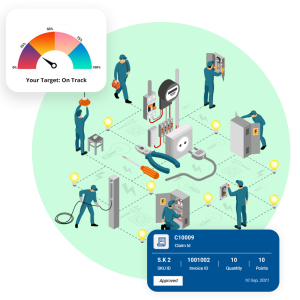Personalized Certificates - Elevating Sales Gamification for Maximum Impact

Welcome to a guide that unveils the power of personalized certificates in the realm of sales gamification.
In this exploration, we’ll delve into the art of recognizing and rewarding sales achievements through personalized certificates, creating a dynamic strategy that fuels motivation, camaraderie, and, ultimately, sales success. Let’s dive into the world of personalized recognition and its game-changing potential.
Understanding Personalized Certificates:
Sales gamification becomes a powerhouse when paired with personalized certificates.
These aren’t just pieces of paper; they’re tokens of appreciation crafted uniquely for each team member, recognizing their specific achievements and contributions.
Let’s explore how personalized certificates redefine the game of sales recognition.
Crafting Unique Recognition:
The essence of personalized certificates lies in their uniqueness. Discover how tailoring each certificate to highlight individual accomplishments adds a personal touch, making your team members feel valued and acknowledged.
We’ll guide you through the process of crafting certificates that go beyond generic appreciation, fostering a sense of individual pride.
Strategic Implementation of Personalized Certificates:
Recognition Beyond Numbers:
Move beyond the typical metrics. Personalized certificates aren’t just for hitting sales targets; they celebrate the journey.
Explore how recognizing efforts, creativity, and collaboration can reshape your team’s approach to success, making sales gamification more holistic and meaningful.
Timely Acknowledgment:
Timing is everything. Discover the impact of timely recognition through personalized certificates.
Whether it’s a weekly spotlight or an instant acknowledgment for a significant achievement, we’ll guide you on integrating timing into your strategy for maximum effect.
Incorporating Team Feedback:
Personalized certificates aren’t a one-size-fits-all solution. Learn how to leverage team feedback to tailor your recognition program.
We’ll explore the value of input from your team in shaping a personalized certificate system that resonates with everyone.
Measuring the Impact:
Boosting Sales Performance:
Let’s get down to numbers. Explore how personalized certificates translate into tangible sales growth.
We’ll analyze data trends to provide insights into the direct correlation between personalized recognition and increased sales performance.
Enhancing Employee Satisfaction:
Happy employees mean a thriving workplace. Personalized certificates contribute to employee satisfaction by acknowledging their efforts.
Infuse joy into your workplace through personalized certificates in our sales incentives gamification. Recognize individual accomplishments uniquely, igniting a culture of happiness and success.
Experience a boost in team morale as every milestone is celebrated with beautifully crafted certificates. Elevate your work environment with personalized recognition, creating a motivated and fulfilled sales team.
In the evolving landscape of sales gamification, personalized certificates emerge as more than mere tokens; they are catalysts for motivation, camaraderie, and heightened sales performance.
This blog underscores the strategic impact of personalized recognition on individual pride, team dynamics, and overall sales success.
Excited about introducing gamification features in your incentive plans? Read our guide on how to gamify your incentive programs.
Connect with us to explore how the strategic implementation of personalized certificates can seamlessly integrate into your sales gamification strategy. Let’s chart a course for personalized success and recognition together, creating a sales environment where every achievement is celebrated uniquely. Your journey to sales excellence begins now.





















